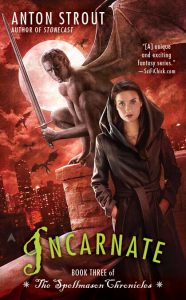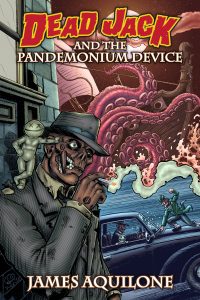Anton Strout Guest Post–“The Eternal & Epic Struggle of Novels vs. Short Stories”
 Years ago, long before I was published, my writing group the Dorks of the Round Table coined a very insightful and totally unique motto: “Writing is hard.”
Years ago, long before I was published, my writing group the Dorks of the Round Table coined a very insightful and totally unique motto: “Writing is hard.”
The whinier it is said, the better. Especially if you drag out the last word and it devolves into a sobbing cry. At best, short stories are annoying buzzing insects set upon this world to distract us fantasists from our BIG BOOK DEADLINES.
Regardless of the motto’s origin, it holds true, more so if you’re the type of writer, like me, who jumps back and forth from novels (seven) to short stories (a baker’s dozen or so). Despite the deadlines on the novels, I find myself compelled sometimes to throw on the hand brake, halt the big book steam train, and go off the rails into the uncharted territory of the short story. Over time, it has become a more familiar landscape to visit, but lordy, is it a different terrain than that of the long form.
The long form allows you to take your time, meander a bit in your storyline. Not to say that you’re seeding filler throughout your novel-length work, mind you. You just simply have more time to develop and expand upon ideas that you can pay out over the long haul of 100,000 words.
The short story? Not so much.
There is a mental changing of gears that happens when I approach a short story, which really isn’t a shocker; there just has to be. The long form approach doesn’t exactly fit the structure of high-risk-high-reward-in-a-small-space that a short story is trying to accomplish. In the short story, you stoke the coal fire hard and it’s full steam ahead from moment one. They are the grandest exercises in brevity, of being concise. Where to begin it, where it leaves you, how much punch can be packed into 5,000-7,000 words…
You’re capturing a moment in time, and in my approach, it’s all about writing a particular moment of a much longer tale without showing too much inclusion of that greater tale. As the author, I have to know what leads up to the moment of the story I’m about to tell you, and what happens after it, but rarely do I show all that. All that unseen world-building merely becomes the color of my short story, coming in hints, dialogue and pieces of that world layered into the story. The meandering mind of the novel has to shut down as the brevity machine kicks in. It’s a different set of mental gears that come into play to do that.
The greater question is why—why stop the big book machine at all? What makes me take time away from my novel-length work to write a short story? Sometimes those stories are elements of the big book that simply don’t fit into the novel-length work. They’re cool ideas that pop into my head, and would be awesome scenes, but on closer examination they prove to be a distraction to the thrust of the novel and therefore have to be removed. Some fall to the cutting room floor and others blossom into short tales outside the scope of the novel.
For example: The world of the Simon Canderous paranormal detective books has an agency that has investigated the paranormal throughout the ages. In building that element of the book world I knew that some of our real world history was a part of it, but to stop and tell the tale of Benjamin Franklin, Necromancer would definitely put the brakes on the book if I included it (this was way before Abe Lincoln fancied himself a vampire hunter, mind you). Instead, that world-building moment became the tale “The Fourteenth Virtue” in The Dimension Next Door anthology. This and the rest of my tie-in short stories give an added depth to their related novels, like adding salt and pepper to flavor to a soup. The short stories aren’t the main ingredient, but they do spice things up.
Then there are the short stories that become something greater, as in the case of “Stanis” from the Spells in the City anthology. I knew I wanted to do a creator/creature tale set in the modern world, and with a love of gargoyles I set out to write just that. “Stanis” is the simple meeting of a young artist and the gargoyle set to watch over her family generations ago. The story takes place over the span of maybe a half hour of time, but there’s a lot of the story’s past crammed in there. In trying to unravel how this artist and gargoyle arrived at their interaction on one particular night, I realized there was a lot more I wanted to explore after figuring out the backstory that barely appears in the short.
I turned the story in, but it continued to gnaw at the back of my mind until I started laying out a novel based around that one scene—everything that led to that meeting and everything that would come because of it. From there that short story became Alchemystic, book one of The Spellmason Chronicles, and grew to three books total based on it. I started with a moment, pulled the camera back on it to reveal more and more until three books later I am wrapping it up in the forthcoming Incarnate, where we see the satellite picture of the world as it has been affected by the moment-to-moment of all these events.
I don’t honestly prefer one over the other. It would be like comparing steak to ice cream—both food, but so inherently different it’s okay to love both completely. For the novel-length work, every book goes from moment to moment, and those moments build on each other like a Voltron of story goodness. In the short story you’re giving one moment, hyper infused with all the moments before it and all the moments to come after. The two forms couldn’t be more opposite, but for me, the shifting of mental gears never leaves a dull moment to be had in either.
About the Author:
Anton Strout was born in the Berkshire Hills mere miles from writing heavyweights Nathaniel Hawthorne and Herman Melville. He currently lives in the haunted corn maze that is New Jersey (where nothing paranormal ever really happens, he assures you).
He is the author of the Simon Canderous urban fantasy series and the Spellmason Chronicles for Ace Books. Anton is also the author of many short tales published in anthologies by DAW Books. His latest book, Incarnate, the third Spellmason Chronicles book, is coming out September 30, 2014. He also has multiple short stories coming out this fall for anthologies such as Blackguards: Tales of Assassins, Mercenaries, and Rogues, and Streets of Shadow.
In his scant spare time, he is a sometimes actor, sometimes musician, occasional RPGer, and the world’s most casual and controlled smashing video gamer. Anton works in the exciting world of publishing and yes, it is as glamorous as it sounds.
He is currently hard at work on his next book and be found lurking the darkened hallways of antonstrout.com or talking with your favorite SF&F authors on The Once and Future Podcast (www.theonceandfuturepodcast.com), where he is host and content curator.


